![]()
The Words of the Kim Family after 2009
|
|
The Words of the Kim Family after 2009 |
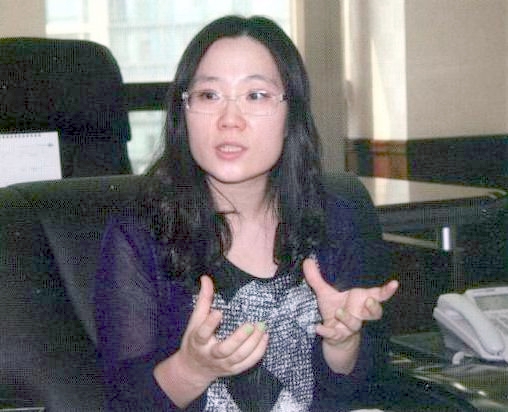
Question: Are your employees hearing something new through this second round of Divine Principle lectures?
The first Divine Principle education given to the employees encompassed the core values of the Divine Principle. We called it the founding ideology and it covered a general understanding of the Divine Principle. You could call it more of a basic course covering a rough picture of the Divine Principle. It was meant to get the employees to understand and feel affinity toward the Divine Principle. The second phase of the education program is more intensive. It is not just understanding but is more about how to practice it in their lives, at home with their families and in the company.
We teach methods to practice the concepts and provide practical guides. We have completed the creation of the program and will implement it in September.
I would like to add one more point. It does focus on practicability, how to practice it in their daily lives and in their families, but the biggest direction that we follow is Vision 2020. Vision 2020, here, means having Hoon Dok families -- families centered on Hoon Dok Hae -- and cultivating the employees so that they can embrace the Cheon II Guk vision, to set up families for Cheon Il Guk.
Question: Do both FFWPU members and non-members attend the program?
Yes.
Question: Give us an example of how you are asking people to practice core values.
Right now, we have divided the main program into two subsections; one is for regular employees and the other is for team leaders, the leading employees of the company. If you go through the program for the regular employees, it may include education on true love and on creating a true family. When it comes to true love and creating a true family, we have some activities that help them learn how to communicate, to listen to their partners within the family based on the Principle. And when it come to the Principle of Creation, for example, we teach about the four kinds of love -- parental love, children's love, love for siblings and connubial love. They learn about the four types of love and their importance and actual activities that they can do to practice these.
What I just mentioned were programs for regular employees. Going on to the leading team, what we do is educate them in the same way as the other employees but we add to this a leadership component as home group leaders.
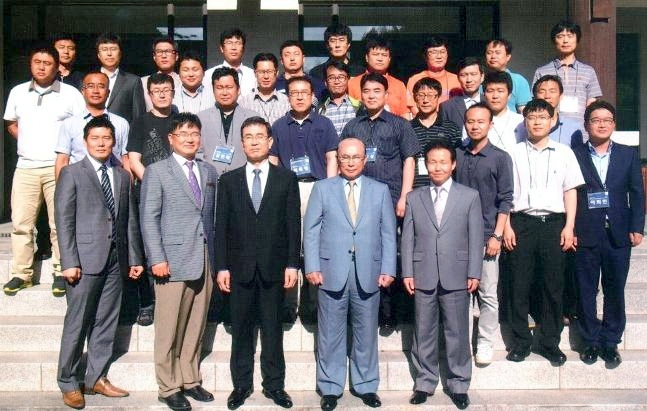
Foundation
employee workshop participants (front row, from left): Hoon O Choi,
senior assistant, Human Resources Office; Geong Eon Yu, Yong Pyong
Resort Marketing Head; Yun Rye Cho, Personnel Management Office Head;
Chairman No Hi Pak and Rev. Do Seon Pak, the main Divine Principle
lecturer
Question: Are you approaching employees in the Foundation and its affiliated companies any differently than the church approaches religious seekers?
Among all the employees, 20 percent are members; 80 percent are non-members. Among those in the 80 percent, some have religion and others do not. Of course, in the beginning when they learned they would have this founder's values education, some were not comfortable with the idea. They understood it in their heads but were not comfortable with listening to the values of the Unification Church. Our first approach or strategy was to have presentations on all the misunderstandings people have about our church. After clarifying this, the employees actually became curious: What exactly do the Unification Church members believe? We moved on to the core values -- perfecting the individual, perfecting the family, perfecting the nation, perfecting the world. Many of them thought that they could use these universal values in their lives. Whatever resistance they had has disappeared.
Now, they just accept it without much resistance. The problem is that it ended at education and has to move on to actual practice. Therefore, we decided to early out a second program through which the employees can connect what they learned to their lives and families.
Question: Is there some worry that once the non-members have gone through this program, members will aggressively try to convert them?
Dr. No Hi Pak has that concern but his wish behind all of these programs would be to witness to the employees as well. If we look at the Korean church headquarters, most of the programs we have been carrying out cannot be referred to without adding witnessing to it. Witnessing has to be one of the main purposes of many of the activities of the church. Of course, people have to want to join these activities voluntarily. During an interview I was conducting with the headquarters, I noticed that the biggest concern they had was that even our internal members were leaving the church. That was one of their areas of anxiety. The only solution they could come up with to protect these members was to develop a strong network to support one another, to help one another and to have one-to-one relationships. In businesses that are related to the Tongil Group, we find many first- and second-generation members that have never actually met one another. They do not know who is who and who is a church member. They have never actually had meetings between church member employees. What we decided to do was to set up central groups within each affiliated business comprising all the first- and second- generation members and work on strengthening the network among the members themselves. We did that and strengthening that network helped them recognize the core values of the church and to spread them by gradually adding non-members to their group.
For those groups to continue their activities and to maintain interest in what they are doing, the groups themselves needed supporters. Whether the leading people in those businesses, who had received home group education, were members or non-members, they took on the role of supporting those home groups within their companies.
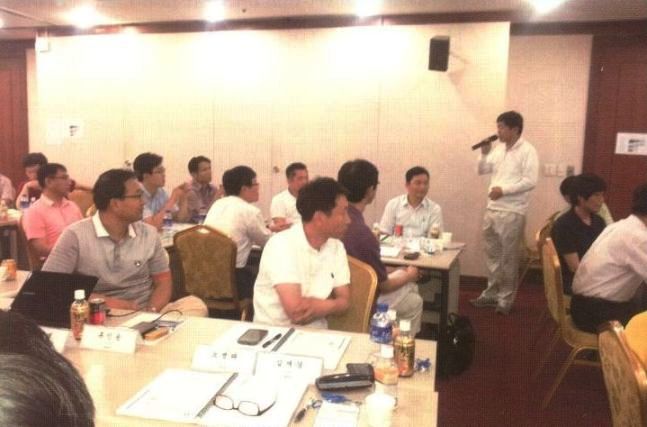
Employees
of the Tongil Foundation and their affiliated companies are learning
how to practice parental love, children's love, sibling love and
conjugal love.
Question: Even though you were giving it in a business context and with some alterations, could you generally describe the areas of Divine Principle that you cover?
In the first phase of their program, we had covered the entire Divine Principle -- the first and second parts. This second phase, which we are still developing, mainly covers only the Principle of Creation, but in a more intensified way.
Question: I was told that when someone was interviewed to work for the Foundation, they understood at that time that they would be receiving some education on the founders' worldview. Is that correct?
That is not actually true. They are employed as they would be by any other business, but as a condition for promotion within their organization or within the Foundation, they need to receive the education on the founder's worldview and his intent in starting the organizations.
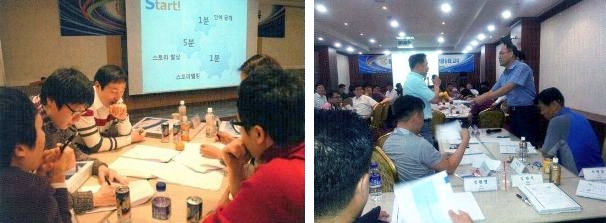
In
the first round of Divine Principle education, Tongil Foundation
employees learned the founder's worldview.
Question: Are you concerned about a future backlash -- that the employees are maintaining a poker face but later will express resentment over having to listen to another groups' religious beliefs?
When Unification Church members look at the Divine Principle we see it from a religious perspective, but at the Tongil Foundation, we see it as the founder's intension, his providential reason for setting up the Tongil Foundation. Why do we look at it in that way? It is important for the employees to understand why an organization was set up, so that they can work with the same heart. It's not as if these are only religious concepts; we express them as core values.
I worked in Samsung before and developed programs for them and for the Woongjin Corporation. Those programs were also on core values. In both Samsung and Woongjin, they also look at their founders as if they were gods.
Their perspective is similar to ours. Likewise, our church's core values are not something especially new or distinctly religious. We emphasize the universal core values that are in the Principle and express it in that way. Among the employees that I have been relating to, none has complained about the content or shown bitterness or resentment toward it. I do know, though, that in the early days of the Foundation, they used to bring in pastors to lecture the Divine Principle. I know that some people were against that; over time, most of those who resented it have left their companies. After a filtration process, employees in the Tongil Foundation do not have bad feelings. They just accept these as our core values.
Question: When you talk about the managers doing Hoon Dok Hae with their families, is that also something Samsung would do?
Regarding Hoon Dok Hae, in Samsung's case, if Chairman Kun Hee Lee gave a lecture I would transcribe it and take out all the key words; let's say that one was "creativity." I would take that word and begin developing many strategies based on that one word and share it. If education were needed among employees on the lecture or the concept of the strategies developed from it, I would be asked to educate all the employees in Samsung about it. Let's say that Chairman Lee was carrying out some activities somewhere, I would transcribe what he said, document his activities and put that on the online board and make sure it was shared among all Samsung employees.
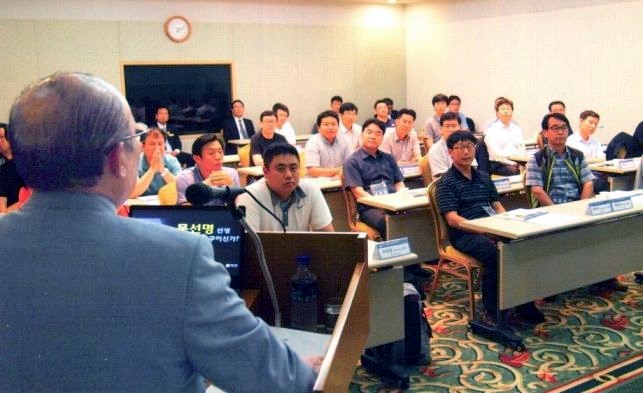
One
of the presentations Dr. No Hi Pak, chairman of the Tongil
Foundation, was slated to give is on the Unification Church and True
Parents, the Messiah.
Question: But isn't the extension into the families of the employees (Hoon Dok Hae with wives and children) somewhat extreme?
When I spoke about the Hoon Dok home groups, I did not actually mean they would do this in their homes with their families. I meant that we set up central groups in businesses with the members. The leaders are in a supporting role to those groups,' so they do Hoon Dok within those central groups. Whether they do Hoon Dok with their families is a personal matter.
Question: What do they read for Hoon Dok Hae?
We don't have a set textbook. The groups choose among the eight great textbooks for Hoon Dok Hae.
Question: Our purpose in interviewing you is to present ideas that our readers can use elsewhere. In light of that, what was the most difficult part of setting up this process and how did you overcome it?
My role in the Foundation is to take care of the process of the development of these programs. When it comes to the process of resolving problems, it is necessary to ensure that there are no errors, no complaints. In order to do that, I had to know the wishes and the opinions of all the different sides, including the Korean FFWPU headquarters,' the employees' and the chairman of the Tongil Foundation.' The first thing I did was to learn in what direction the Korean church headquarters was leading all its educational programs. I had to analyze the materials they were using when educating members. I had to scrutinize or collect all the opinions of the employees about having this education before I began creating it. I also had to take into consideration the president's opinion because he was working toward a particular destination. I had to get the opinions of second-generation members that work or interact with the Foundation. I had to ask them what they thought about it. I had to speak to Divine Principle lecturers about how to approach this program for employees. After considering all those opinions, I had to assess the content and filter some of it so that the employees would not have any resistance to it. I used some of the True Love education material from the headquarters' Family Department. We have finished forming the concept of the second-phase education but we have not fully developed the program. We are still in the final stage of development. We have formed the concept of how we will educate the employees. I have reported the concept to Dr. No Hi Pak and the central groups comprised of church members in each business.